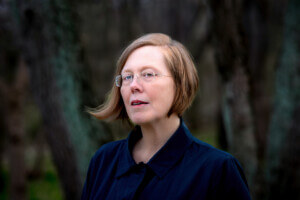In early September, the office of Cornell University Architecture, Art, and Planning (Cornell AAP) professor Samia Henni was broken into, vandalized, and looted. This week, architects and academics have rallied in support of a more appropriate official response to this act.
According to a now-circulating open letter dated November 29, following this event, in which “sensitive materials were stolen from Dr. Henni’s office,” the Cornell University Police Department and Cornell University did not inform the community about the attack and has elected to not make public the findings from its investigation. The letter states that “this is all the more concerning given that Henni has been the subject of online hate harassment and intimidation in 2020/2021, following the publication of the article, The Coloniality of an Executive Order, and the lecture, ‘Palestine is There, Where it Has Always Been,’ that she convened at Cornell University’s Department of Architecture, as part of the lecture series ‘Into the Desert: Questions of Coloniality and Toxicity.’” As Henni is particularly outspoken on issues relating to Palestine, the letter suggests that this invasion was a targeted incident.
The letter takes the form of an online petition. As of this writing, it has been was signed by over 1,000 architects, academics, and students from around the world. The letter demands that Cornell release “a full disclosure of the police report and evidentiary material to Dr. Henni,” offer a “public condemnation of the attack by Cornell University,” and take action to install “measures to guarantee academic freedom and ensure the safety of threatened faculty, especially women of colour. ” Prominent signatories include Eyal Weizman, Sumayya Vally, Lesley Lokko, Philip Ursprung, Keller Easterling, Daniel Barber, Mabel O. Wilson, Anna Puigjaner, Jean-Louis Cohen, Reinhold Martin, Giovanna Borasi, Mohamed Elshahed, Mark Wigley, Zeynep Celik, Florian Idenburg, and Douglas Spencer, among hundreds of others. Musician Nicolas Jaar has also signed the letter.
Henni, born and raised in Algiers, Algeria, is an assistant professor in the Department of Architecture at Cornell AAP. She has written and lectured extensively on topics related to colonization, displacement, and war as they relate to the built environment and urban studies. Beyond editing the recently published Deserts Are Not Empty, Henni is the author of several books and previously taught at Princeton University, ETH Zurich, and Geneva University of Art and Design.
An excerpt of the open letter, titled “Universities Must Guarantee Academic Freedom and Safety and Condemn Violence,” reads:
The attack on Dr. Henni should have received swift public condemnation from Cornell University and no effort should have been spared in regards to the crime investigation, academic freedom, and personal safety. Instead, Cornell University Police Department did not notify Cornell community through the usual crime alert, and Cornell University did not make the attack known to the broader academic community, nor did it condemn it. This failure imperilled the rest of the academic community, especially women of colour, compromised Dr. Henni’s safety, and reinforced her isolation and vulnerability. Given previous attempts to intimidate Dr. Henni, Cornell University should act decisively to generate safety and justice, and condemn intimidation and discrimination.
The Cornell University Police Department has decided not to share the results of the investigation with Dr. Henni outside of legal proceedings. In many different jurisdictions, the victims of similar violations (or possibly) hate crimes, have the option to access investigation material, receive closer support, and rely on a transparency of information.
This raises serious questions about public safety, especially for women of colour, and academic freedom, especially for those working on colonialism, apartheid, and Palestine, for the Cornell community and scholars more broadly.
The letter can be read in full here.
In a response to AN’s request for comment, Joel M. Malina, vice president for University Relations at Cornell University, said that “the Cornell University Police Department (‘CUPD’) is pursuing all leads. The leadership of the College of Architecture, Art and Planning, as well as the provost’s office and CUPD, have all met multiple times with Professor Henni, and the university will continue to offer support.”











